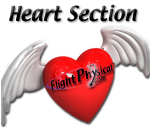Excerpts from AME Guide |
 |
Examination Techniques:
Item 36. Heart Medications
The FAA will consider an Authorization for a Special Issuance of a Medical Certificate (Authorization) for most cardiac conditions. Applicants seeking further FAA consideration should be prepared to submit all past records and a report of a complete current cardiovascular evaluation in accordance with FAA specifications.- Medications acceptable to the FAA for treatment of hypertension in applicants include all Food and Drug Administration approved diuretics, alpha-adrenergic blocking agents, beta-adrenergic blocking agents, calcium channel blocking agents, angiotension converting enzyme (ACE inhibitors) agents, and direct vasodilators. Centrally acting agents (such as, reserpine, guanethidine, guanadrel, guanabenz, and methyldopa) are usually not acceptable to the FAA. Dosage levels should be the minimum necessary to obtain optimal clinical control and should not be modified to influence the certification decision.
- The AME may submit for the Federal Air Surgeon's review requests for Authorization under the special issuance section of
Part 67 (14 CFR 67.401) in cases in which these or other usually unacceptable medications are used. Specialty evaluations are required in such cases and must provide information on why the specific drug is required. The AME's own recommendation should be included. The AME must defer issuance of a medical certificate to any applicant whose hypertension is being treated with unacceptable medications. The use of nitrates for the treatment for coronary artery disease or to modify hemodynamics is unacceptable.
The use of flecainide is unacceptable when there is evidence of left ventricular dysfunction or recent myocardial infarction.
Note: Numbers correspond to the required entry in the AME portion of the FAA Form 8500-8
Note: Numbers correspond to the required entry in the AME portion of the FAA Form 8500-8
